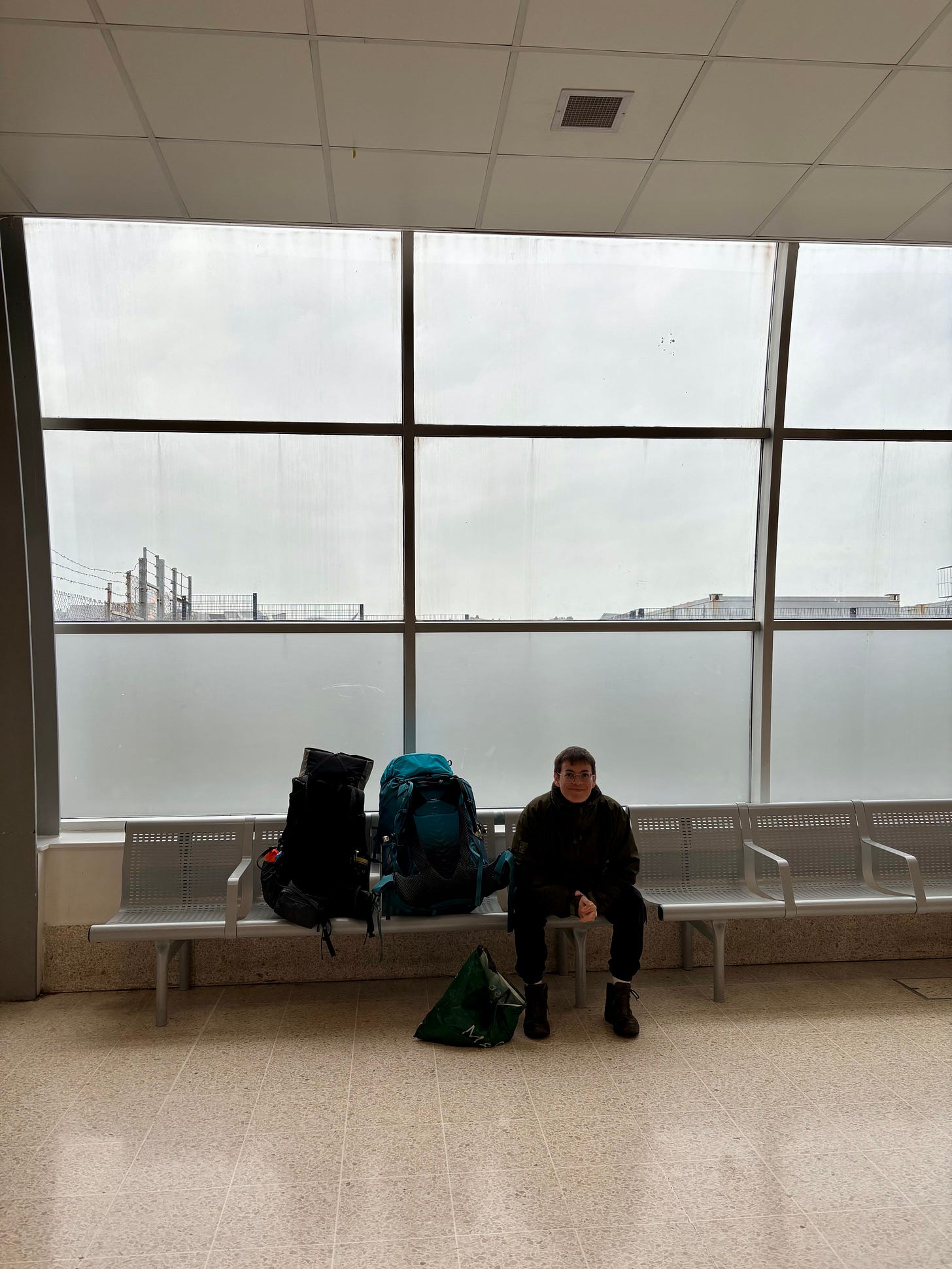How to walk 300 miles - part 2 - the ferry
have you ever listened to the The Rest is History episode about the Titanic?
A couple of years ago, I was offered a tour around Europe supporting We Are Scientists. The only way I could afford to do the tour (after paying for the carnet, the extra Brexit paperwork) was to spend less than 20 Euros a night on accommodation. So, and feel free to call me a nepobaby, I asked my mum if I could borrow her campervan. The tour ran from the end of March into the first few weeks of April and I figured that sure, it’ll be warming up nicely by then in Bratislava. A few months later me and my girlfriend would draw pictures in the ice that formed on the inside of the van's windows in the mornings.
Something feels possible about the March / April transition. Every year it feels like a good time to get up out of bed and do something. January can dead itself, February has a lot to answer for, but March, she’s different. Perhaps that’s why I decided on the last week of March to walk across Ireland, just over six months after my sister Jessie’s death. My girlfriend R said March would be far too cold and wet, just like the We Are Scientists tour. But I banked on the March weather we’d had in the UK during the first covid lockdown, where there were almost Titanic divisions in quality of life, depending on whether or not you had a garden (reader, I did not have a garden).
For the walk across Ireland, I booked the ferry aiming to be home by Easter Sunday. With the exception of cold mornings and a completely unexpected four-minute hail storm, we had pristine weather for almost three weeks solid. People would comment that we were unusually blessed with the sunshine. I wrote in my notebook: “ten days of uninterrupted sunshine, I must have some sway in heaven” which is sort of annoying because if Jessie had sway with literally God I think she would have better things to do than give me nice weather on my outdoor pursuits. But it is comforting to feel that you are being watched over, guarded by your ancestors and lost loved ones, even if it is not likely to be true. You never know though, do you?
We caught the Ulysses ferry from Holyhead to Dublin. Stepping onto the boat was like waking from sedation half-way through being abducted. It suddenly occurred to me that I had signed myself and R up for walking across an entire country with 14kg of weight on our backs. That dawning, and the sway of the boat, had my insides wriggling and I did what I often do when I’m overwhelmed, I went mute. And I got really engrossed in the golf on the big TVs. R's new joke about me is that if your Dad likes it then so do I - history podcasts, the film Gladiator, DIY, the pub, paying with cash, birdwatching, saying “that's not a fish it’s a shark!” when ordering fish and chips. Just put me in a gilet and hand me a spreadsheet. A fair few of my airport dad skills came in handy whilst planning this trip.
I find the ferry a uniquely sad space since losing my sister, thinking of the journey that she never took home, the journey that her partner and children did, bringing her little girls back from holiday without their mum. It is painful to look at directly. These were the contents of my sad, mute soul on that ferry towards Ireland. As I drifted down miserably into myself, I was yanked back into the present by a cherubic eight-year-old boy with a whistle. A proper referee's whistle. He was blowing into it to provoke the girls he was travelling with, desperately seeking their attention. "Who gives their child a whistle on a ferry?" I wrote in my notebook. “Perhaps it’s for Titanic-style emergencies?”. The poor boy only managed to squeeze the most languid of eye rolls out of the girls. Welcome to the rest of your life, little guy.
We disembarked the Ulysses on foot and proceeded to follow the walking-men signs out of the docks. Needless to say, we were the only passengers using the pavement. We were offered a lift after about 500 metres by a friendly Brummie who could not understand why we “weren’t allowed” to get in his car, and he drove off, amused. The walk to our hotel for the night was about 5km and I was already tired.
The phrase “one day at a time” is understandably popular during grief. I’ve found it a helpful mantra when my head would spin with all the pain I might meet in the future. Similarly when we began walking it was helpful to repeat the same incantation. One step at a time. The thought of the nearly-300 miles we’d need to cover to get to our destination felt impossible, but to take each day of roughly 15 miles was to dismantle a poorly made shed, make an orderly pile of the material and to begin reconstruction.




